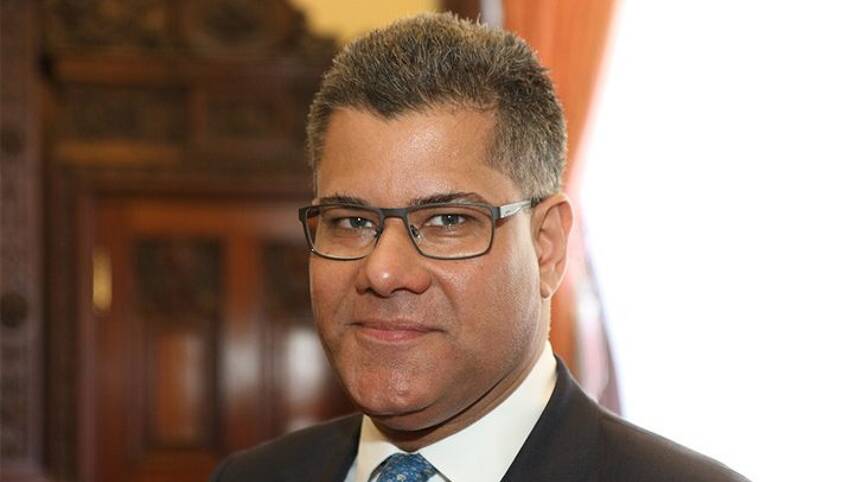Register for free and continue reading
Join our growing army of changemakers and get unlimited access to our premium content

Sharma will give his first major speech since the creation of the Glasgow Climate Pact in November
Sharma, who is presiding over the COP presidency until COP27 in Sharm-El Sheikh, Egypt, in November this year, today (24 January) gave his first major speech since the creation of the Glasgow Climate Pact in November.
The COP26 President stated that nations must maintain the urgency expressed in Glasgow to ensure that decarbonisation enables the world to keep 1.5C alive in the build-up to COP27. At an address at Chatham House central London this morning, Sharma offered his priorities for the Presidency team.
“At COP26 itself almost 200 countries came together and agreed on the historic Glasgow Climate Pact. In doing so they demonstrated that climate can create a space for cooperation amidst a splintered global politics, that the world can work together to improve our common future, to address major global challenges and to seize opportunities. The Glasgow Climate Pact was a product of international cooperation and a practical demonstration of Global Britain in action,” Sharma is expected to say,
“There is no doubt that the commitments we secured at COP26 were historic. Yet at the moment they are just words on a page. And unless we honour the promises made, to turn the commitments in the Glasgow Climate Pact into action, they will wither on the vine. We will have mitigated no risks. Seized no opportunities. We will have fractured the trust built between nations. And 1.5 degrees will slip from our grasp.
Key to Sharma’s priorities in the build-up to COP27 is that nations keep promises to strengthen climate targets this year.
Under the Glasgow Climate Pact, nations have been requested to consider, formulate and publish updated Nationally Determined Contributions (NDCs) to the Paris Agreement for 2030, by the time COP27 begins in Egypt this year.
These nations should strive to align their climate targets and plans with a 1.5C temperature pathway, the text says. Some nations had been pushing for this to be a requirement, others for its omission entirely. In the end, the document states that the UN will “take into account different national circumstances”. Nations including China, South Africa and Indonesia have stated they will likely need more time.
There is also an agreement for nations to begin developing NDCs through to 2039.
Many nations had only just updated their existing NDCs going into COP26, in a bid to move away from a 2C pathway towards a 1.5C trajectory. The UK, for example, updated its NDC after exiting the European Union, targeting a 68% reduction in emissions by 2030. This new “ratcheting mechanism” will enable the public and other nations to scrutinise slow movers on climate action, which pushes the world closer to a 1.5C alignment requested in recent IPCC reports.
Sharma is expected to note the significance in nations phasing out coal power through new policies, as well as increasing efforts to halt deforestation and transition to clean vehicles.
Sharma will also focus on delivering commitments on adaptation and loss that were central themes of discussions at COP26.
At COP26, nations including China and the G77 – which represents 134 developing and emerging economies – expressed anger that their proposals for a Loss and Damage finance facility had been watered down, following reported interventions from the US and EU.
Such a facility would see developed nations offer reparations for vulnerable nations to respond to the damage caused by climate-induced events. Some African nations already see 10% of GDP equivalent spent on adaptation and damage repair annually.
There were major huddles in the plenary room just before the gavel came down on the Glasgow Climate Pact. Developing nations wanted, instead of further talks, a time-bound and numerical commitment to this COP.
The Pact does confirm that a “technical assistance facility” will be introduced to support loss and damage in relation to climate change in developing countries. This will fall under the Santiago Network from the UNFCCC, but many developing nations left Glasgow reeling from the lack of cooperation from developed nations to support them through additional finance.
Another key focus is that of climate finance and the delivery of the $100bn goal. The Glasgow Climate Pact does reiterate a commitment to deliver on existing financial goals that have been woefully ignored in recent years.
The Pact notes that the “current provision of climate finance for adaptation remains insufficient”. As such, the Glasgow Pact urges developed countries “to at least double their collective provision” of climate finance for adaptation to developing nations from 2019 levels by 2025.
Just before COP26, the governments of the UK, Germany and Canada forecast that the historic commitment for developed nations to provide $100bn of climate finance annually to developing nations would not be met this year, with 2023 being the first year the full amount was paid.
Matt Mace


Shame the Glasgow commitments aren’t anywhere near what is needed to avert catastrophe. Our ‘leaders’ have no clue just how gargantuan are the numbers or how equally huge ad fast the response has to be. See http://bit.ly/BorisClimateSpeech1.